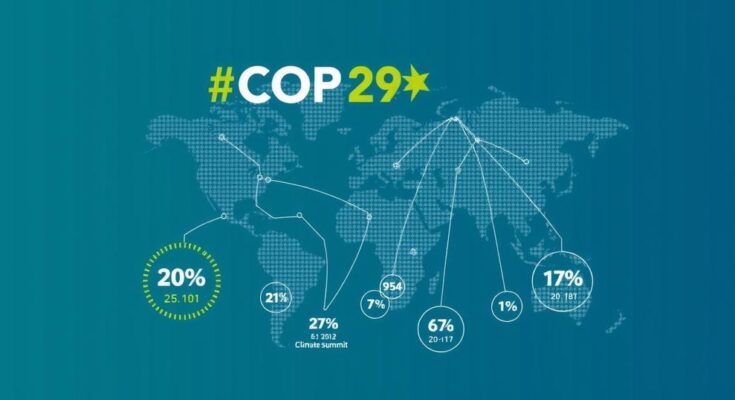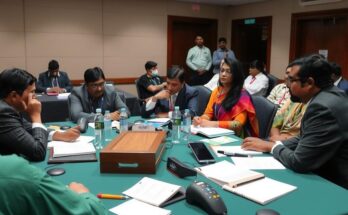The COP29 climate summit, held in Baku, resulted in a contentious agreement targeting $300 billion per year for climate finance by 2035, deemed insufficient by many developing nations. The election of Donald Trump dampened expectations for U.S. contributions, while advancements in carbon credit regulations were made. Concerns over rising global temperatures and trade barriers were also prominent, amid criticism of fossil fuel influences on negotiations.
The COP29 climate summit, held in Baku, Azerbaijan, concluded with a significant deal on climate finance, although it proved contentious and came two days past the deadline. The primary focus was to establish a new annual climate finance target, resulting in an agreement to reach $300 billion per year by 2035. However, many developing nations voiced concerns, deeming the target insufficient for facilitating a necessary global shift to clean energy. Some nations accused wealthier counterparts of attempting to include contributions from developing countries in this target, further complicating negotiations.
The mood at the summit was notably affected by the election of Donald Trump, who, despite not yet taking office, had pledged to withdraw the United States from international climate agreements and appointed a climate skeptic as energy secretary. This situation diminished the expected contributions from the U.S., the leading historical polluter, and dampened overall ambition regarding global climate finance targets.
COP29 also made strides in the carbon credit domain, agreeing to frameworks for nations to create carbon credits. This development aimed to facilitate financial flows into climate-positive projects. Nonetheless, details regarding registry structures and transparency are still pending, and stakeholders hope this enhancement will act as a magnet for investment in climate initiatives.
Despite these advances, participants underscored the urgency of the global climate crisis, evidenced by a continuous rise in greenhouse gas emissions and global temperatures. The year is projected to be one of the hottest on record, drawing attention to extreme weather incidents that have stricken various regions, causing humanitarian disasters and economic losses.
Developing nations advocated for discussions on climate-related trade barriers, especially in the context of Europe’s proposed carbon border tax. This discourse has been escalated by concerns over potential new tariffs proposed by the incoming U.S. administration. The UN climate body has agreed to postpone deliberating these issues to subsequent summits.
Lastly, the summit was criticized for being hosted in a country reliant on fossil fuels. There was an apparent failure to build upon the previous COP28 commitment to accelerate the transition away from fossil fuels. Many deemed this a significant setback that illustrated the continuing influence of fossil fuel interests over climate negotiations.
The COP (Conference of the Parties) serves as the supreme decision-making body of the United Nations Framework Convention on Climate Change (UNFCCC). The 29th session, COP29, was a pivotal moment for global climate discussions as it attempted to navigate critical financial commitments related to climate change. It took place in Baku, Azerbaijan, where countries convened to negotiate funding for climate initiatives, address trade implications for developing and developed nations, and grapple with the impacts of fossil fuel dependency amid a growing climate crisis.
The COP29 summit underscored the persistent challenges facing global climate governance. While the agreement to establish a climate finance target signifies progress, it highlights the dissatisfaction among developing nations about the inadequacy of funding commitments. Furthermore, the election of a climate-skeptical leader in the U.S. casts a shadow over future cooperative efforts in climate finance and action. As extreme weather events escalate and affect millions globally, the urgency for substantial advancements in climate strategy remains paramount.
Original Source: kathmandupost.com




